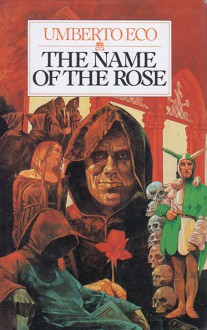Reviewed by gmcgregor on
It's about faith. It's about sin. It's about various schismatic movements within the Catholic Church in the 1200s and 1300s (the time of the anti-popes). It's about laughter and poverty and their roles within the lives of the cloistered. It's about those cloistered, their relationships with each other and the outside world. It's about books and learning and whether wanting to learn more is always a good thing and whether knowledge should be controlled. It's about power and having it and wanting it.
The story follows Adso, a young novice monk, traveling with Brother William of Baskervilles, a Franciscan when Franciscans were a very new movement. They arrive at an abbey famous for its incredible library and are begged by the abbot to help inquire into the death of a monk just the night before. William, who is an obvious and intentional analogue to Sherlock Holmes, is intrigued and goes about investigating. Was it a suicide? A murder? And every day, another monk keeps turning up dead, making William and Adso's work a race against time.
I can already tell I'm going to need (and want) to read this one again. It's so dense, so full of allusions and historical references I just don't understand, that it's obvious that to read this only once means that you'll never be able to fully appreciate it. It reminds me of Dante's Divine Comedy, in that it's certainly readable and enjoyable on its own, but without a fuller understanding of the world at the time, you can't really understand everything that's going on. So I'll need to read up on the establishment of the Franciscan order and the other religious splinter groups that developed around the same period and tackle this one again. The writing is lively and the characters and drama compelling enough that I'm sure it'll be a rewarding experience. But for the first time through, despite having liked it, I feel like I've missed enough that it wasn't quite as satisfying as it could have been.
Reading updates
- Started reading
- 12 June, 2016: Finished reading
- 12 June, 2016: Reviewed
